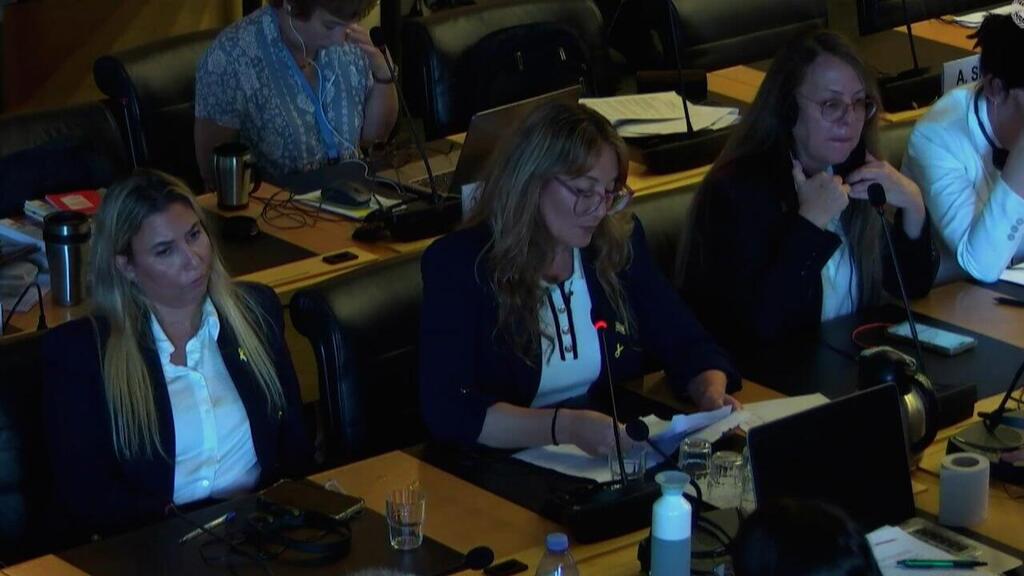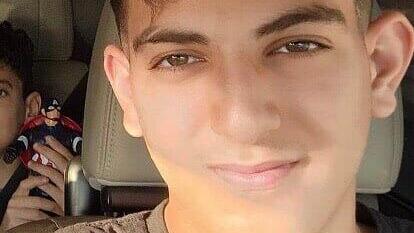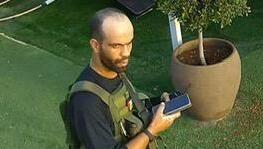Getting your Trinity Audio player ready...
Sabine Taasa addresses the UN's Committee on the Rights of the Child in Geneva
(UN)
"You need to take the responsibility to understand the horror," Sabine Taasa from the southern Israel moshav Netiv Ha'asara told the UN's Committee on the Rights of the Child (CRC) in Geneva on Tuesday, imploring members to watch a video clip showing the murder of her son and her husband along with over 1,500 others during the Hamas massacre of October 7.
"I have video documentation that shows the horrific murder of my son and my husband," she said. "I am a mother of four. Or, who was murdered on the Zikim beach; Zohar, who is traumatized, cannot sleep at night and wets his bed; Koren who began limping, sleeps with me in bed and is unable to step outside. He has lost his faith in people after seeing his father blow up from the grenade hurled at them; Shai, who is blinded in one eye, also traumatized, wets the bed and sleeps with me. He cannot stand being away from my side for more than a couple of minutes. He is scarred for life."
3 View gallery


Sabine Taasa addresses UN's Committee on the Rights of the Child in Geneva
(Photo: UN)
Taasa, a French-Israeli citizen, told the committee how her 17-year-old son, Or was killed by the terrorists, shot six times in the head. "Mom, don't worry, Mom everything will be okay," he told her in his last call at 6:45 a.m. on October 7; Moments later he was dead.
Her husband, Gil, was killed by the blast of a grenade, while protecting his family including 13-year-old Koren and 9-year-old Shai, who were sheltering in their secure room. The terrorists then shot at his body from close range, to make sure he was dead. The kids witnessed the entire event. Zohar, 16, was not at the family home at the time of the attack.
" Three terrorists were in my house, they tried to kill my children. My children are suffering," she said. "There aren't enough psychologists, professionals to take away the suffering." She also said that the teachers at school want to help but many of them also suffered the loss of their children, fathers, husbands or wives, and were traumatized themselves.
"In the years living near Gaza, I was mentally prepared for that day. I slammed the door in the face of the armed terrorists when they arrived. They said they were going to kill me and I locked the door. Luckily it was made of steel and the bullets did not go through. When they threw explosives, the fortified shelter door held strong," she said.
Taasa told the committee that, since 2001, residents near the Gaza border have been subjected to terror and rocket attacks from Hamas.
"I know there are many residents of Gaza who are innocent, many children who are innocent, but also we, in Israel, are innocent and you must understand that," she said. "We are not killers, we are not murderers we are fighting to try to protect our lives, to protect our children. I don't want to hear accusations. We want to live in peace with our neighbors."
She asked the members to believe her. "Jews live harmoniously with Muslims in Israel, the problem is Hamas. They must be eradicated; we need to find a solution and change the narrative," she said.
Taasa said she was working to not speak impulsively and to consider her words. "Look at the film please, without judgment. Look at the film and you'll understand better," she said. "Look at our two little children who saw their father blow up before their eyes. It is hard to watch, but that is life in Israel."
While in Geneva, Taasa learned that Ahmad Wadia, the Hamas terrorist who commanded over the attack on her community was killed by the IDF in Gaza. He is seen in the video released by the IDF, calmly taking Coke out of the family's fridge and sipping it while the two small boys who are injured and have just seen their father murdered look on.







